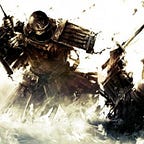Military Officers Are Probably Not Getting Stupider.
And there is more to success than the standard way we measure intelligence.
At the risk of appearing anti-intellectual, there is insight in these words.
In a recent article on Tom Ricks’ blog, the suggestion is made that military officers are less intelligent than in the past, that this is the result of several factors which include military policies, and that this is a dangerous trend in terms of future strategic results. Unfortunately, in all the talk of intelligence, the arguments made are rather poorly reasoned. The irony here should be obvious.
To start, this is simply far too bold a claim based on the evidence available. Even without seeing the details of Cancian’s data, several potential methodological issues present themselves, from test design (GCT as a measure of intelligence, particularly over time) to trying to generalize from such a small, specific, sample.
Further, the Marine Corps has even acknowledged that the GCT isn’t even used as the primary metric in evaluating potential officers. A battery of other tests take precedence, and in these test officer candidate’s scores have remained consistent over the years. This points to a problem in the GCT as a measuring tool.
The Flynn Effect implies increasing intellience across human populations and testing of the U.S. population shows a consistent increase in IQ over the past 100 years. So one might reasonably suspect that if we examined the issue in depth, we’d find that military officers are actually more intelligent in absolute terms than in the past, even if they may not be so relative to the population in general.
And this doesn’t necessarily violate the principle that “all things being equal, we want more intelligent officers,” as we may actually have them.
Even if this is a concocted problem, however, it doesn’t mean we shouldn’t be focused on more intellectual rigor in ore-commissioning and Professional Military Education, as we have discussed before here and here.
As for the claims about bias against intelligence in the promotion system, we haven’t yet examined the work of Spain, Mohundro and Banks, but it doesn’t seem unreasonable given the many acknowledged problems with the Army’s evaluation/promotion systems.
To its credit the article does note that there are other values besides intelligence necessary for the military officer. Anyone with military experience can attest to having witnessed an individual who was tremendously intelligent but lacked common sense. Further we must remember that rationality and intelligence are not the same thing.
To highlight this, we offer two applicable quotes, from a previous article:
The first comes from a report on recruiting for the Office of Strategic Services in WWII:
“The organization has been recruiting too many men, civilian or military, who have intelligence and sometimes the necessary mechanical training but who lack common sense, know nothing about working with men or how to look after the welfare and morale of the men under them. We simply must have men who can shoulder responsibility and use initiative with common sense. Simply because a man is intelligent does not qualify him for this type of work.”
The second quote is by Field Marshal Hermann Balck, in interviews after WWII, who made a similar observation in discussing a fellow officer:
“It is interesting to note, incidentally, that this fellow was a highly rated General Staff officer. Clever, but unfortunately not very practical. So we were always brought back to the fact that cleverness is a curse. Clauswewitz once said, ‘Man needs a harmony of strengths.’”
To Ricks’ main point, that strategic success hinges largely upon the individual intelligence of our senior officers, this is also simply presumed rather than examined.
As Cathal J. Nolan, author of the recent book The Allure of Battle, has noted,
“There is heroism in battle but there are no geniuses in war. War is too complex for genius to control. To say otherwise is no more than armchair idolatry, divorced from real explanation of victory and defeat, both of which come from long-term preparation for war and waging war with deep national resources, bureaucracy and endurance. Only then can courage and sound generalship meet with chance in battle and prevail, joining weight of materiel to strength of will to endure terrible losses yet win long wars. Claims to genius distance our understanding from war’s immense complexity and contingency, which are its greater truths.”
To be sure, intelligence is important, but international relations and security, policy, and strategy tend to be the consequence of interagency effort, teamwork, consensus, compromise, politics, bureaucracy and organizational psychology rather than the single-minded vision of a few technocrats. Therefore, smart systems are more critical than smart actors (think General Staff vs. Great Captain models). In that respect, the very attributes we mentioned before — leadership, teamwork, common sense, endurance, etc. are likely far more impactful than individual intelligence (though influenced by it) when it comes to strategic success.
-LM
